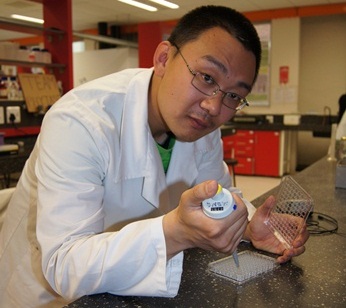For many of us, savoring the meat found inside a crab exoskeleton (chitin) while eating a mouthwatering seafood meal like a crab curry is definitely a treat.
The shells are then discarded into our bins, marking the end of that delicious dish. Commercial seafood industries also discard the shells into the sea or landfills. Meng Zhang’s curiosity however got the better of him, and so began a three-year research journey of trying to find out how the chitin can be transformed into products that are useful to mankind.
With the help and guidance of Professor Suren Singh, Applied Sciences Faculty Executive Dean; Professor Kugen Permaul, Biotechnology Research Supervisor and Dr Nokuthula Mchunu-Nxumalo, Biotechnology and Food Technology Lecturer, Zhang undertook his MTech (Master of Technology) research project in the Department of Biotechnology and Food Technology. Profs Singh and Permaul head a vibrant Enzyme Technology Research Group, which focuses on the production and application of thermostable enzymes important for the food, detergent, textile, pulp and paper industries as well as the environment.
Titled: The chitinolytic enzyme system of the compost-dwelling thermophilic fungus Thermomyces lanuginosus SSBP, Zhang’s research analysed left-over crustacean shells and found they have medicinal usage in terms of producing glucosamine, a white powder used to curb arthritis. He isolated chitinase enzymes used to breakdown chitin material which can also be used to inhibit the growth of some fungal pathogens in the agricultural sector. “There are other different products which can be produced using the compounds found in the chitin. It can be used in the medical industry, for example, producing dissolving stitches which are used for internal organ surgery procedures and the chitin can also be used as an ingredient for making of contact lenses. It is also the first time that these two chitinase enzymes (CHIT3 and CHIT4) have been found to be useful in degrading chitin and have anti-fungal activity,” said Zhang.
Prof Permaul said one of the research projects his (research) team is currently working on is a product called glucosamine; a commercially available supplement which is widely used to treat arthritis. He said the chitin can also be used to make plastics. “The aim is to continue with research to make plastic. This plastic will be renewable, eco-friendly and a biodegradable product. Plastics are usually made from crude oil but if we have to make plastics from this chitin, it will be biodegradable, meaning it won’t cause pollution problems by persisting in the environment. When they do break down by natural processes, they will release compounds that will be recycled.
Another exciting prospect is to make an edible plastic from the crustacean shells,” said Prof Permaul.
The ‘curry-loving’ Zhang has been in South Africa for 10 years now and devotes all his time to either working in the Biotechnology laboratory or playing soccer. He stressed that he is keen to do his PhD, but has not decided on a research topic and does not have funds to do so as yet. He is hoping to obtain funds to do his PhD at DUT and also hopes that business stakeholders in the private sector can possibly help in this respect. In the interim, he is currently on a one-year contract at the newly established DUT Confucius Institute, under the helm of Dr Eddie Chaobo Fu.
Earlier this month (September), Zhang graduated cum laude and received the prestigious Dean’s Merit Award for academic excellence when he received his MTech degree.
– Waheeda Peters
Pictured: Meng Zheng continues researching compounds at the research lab, planning to do his PhD at DUT soon.


